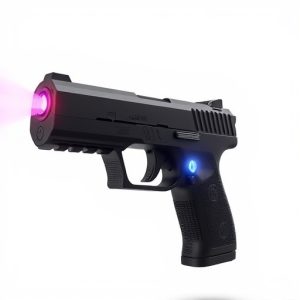Civilian Taser Ownership: State Laws, Eligibility, and Legal Guide
Understanding and adhering to state laws is crucial for responsible triad stun gun ownership in the…….
Understanding and adhering to state laws is crucial for responsible triad stun gun ownership in the US, where regulations vary widely. Before acquiring a triad stun gun (taser), research your state's specific rules regarding civilian ownership, including age limits, permit requirements, training courses, and prohibited carry locations. Ensure you meet eligibility criteria, such as being 18 or older with a clean criminal record, and purchase from a licensed dealer to guarantee authenticity. Safe storage, maintenance, and accurate paperwork completion are also essential for legal compliance and reliable performance when needed.
“Unraveling the legal landscape of civilian tasers, this comprehensive guide delves into the ownership requirements set forth by state laws across the nation. From ‘Understanding Civilian Taser Ownership’ to ‘Buying and Possessing a Taser’, we explore the intricate details.
Discover the ‘State-by-State Regulations’ that dictate who can own a ‘Triad Stun Gun’, a popular choice known for its effectiveness. This article is your go-to resource for navigating the legal aspects of acquiring and possessing non-lethal self-defense tools.”
- Understanding Civilian Taser Ownership: A Legal Perspective
- State-by-State Regulations: Uncovering the Requirements
- The Triad Stun Gun: Features and Legal Implications
- Eligibility Criteria: Who Can Own a Taser?
- Buying and Possessing a Taser: A Step-by-Step Guide
Understanding Civilian Taser Ownership: A Legal Perspective
Understanding civilian tasers, or triad stun guns, involves navigating a complex web of state laws and regulations. In the United States, the legal landscape surrounding non-law enforcement stun gun ownership varies significantly from one state to another. Some states allow open carry, while others restrict stun guns to concealed carry with specific permits. Additionally, certain states have outright bans on civilian stun gun possession.
These laws consider factors like public safety, personal protection, and the potential for misuse. As a result, regulations often include age restrictions, waiting periods, and requirements for training or licensing. It’s crucial for anyone interested in owning a triad stun gun to thoroughly research their state’s specific rules to ensure compliance and responsible ownership.
State-by-State Regulations: Uncovering the Requirements
In the United States, the regulations surrounding civilian ownership of a triad stun gun (a type of taser) vary significantly from state to state. Each jurisdiction has its own set of requirements and restrictions that govern the purchase, possession, and use of these devices by non-law enforcement individuals. Understanding these state-by-state regulations is crucial for anyone interested in acquiring a triad stun gun for personal protection or other lawful purposes.
To uncover the specific requirements, prospective buyers must consult their state’s laws and local ordinances. Some states allow open carry with a permit, while others restrict possession to concealed carry licenses. Age restrictions also vary, with some states mandating a minimum age of 18 or even 21 for stun gun ownership. Additionally, certain states have specific prohibitions against carrying stun guns in certain locations, such as schools, workplaces, or public transportation hubs. Knowing and adhering to these regulations is essential to ensure compliance with the law and avoid legal repercussions.
The Triad Stun Gun: Features and Legal Implications
The Triad Stun Gun, also known as a tactical electronic control device (ECD), is designed to incapacitate individuals through electric shock. It typically consists of two pronged probes connected to wires that deliver an electric current upon activation. This non-lethal weapon has gained popularity among civilians seeking self-defense options, but its usage comes with specific legal implications.
In many states, the Triad Stun Gun is regulated under laws pertaining to stun guns or ECDs. Ownership requirements often include age restrictions (usually 18 years or older), background checks, and training or certification. Some states allow open carry while others mandate that it be stored in a locked container or out of view. Additionally, there may be restrictions on the voltage output, power source, and specific uses, such as for law enforcement only or not allowing the device to be used against certain vulnerable populations. Understanding these legal frameworks is crucial before considering the acquisition of a Triad Stun Gun.
Eligibility Criteria: Who Can Own a Taser?
In most states, the eligibility criteria for owning a taser, or more specifically, a triad stun gun, involves meeting certain age and background requirements. Typically, individuals aged 21 years or older are permitted to purchase and possess these devices. Some jurisdictions may also mandate that applicants complete a safety training course to ensure responsible use. This training often covers safe handling, storage, and the legal implications of using a stun gun.
Beyond age and training, a clean criminal record is usually a fundamental criterion. State laws vary, but applicants may need to pass a background check to demonstrate they are not prohibited from possessing firearms or have no history of violent crimes. This ensures that only law-abiding citizens with a basic understanding of self-defense and safety are authorized to carry a triad stun gun.
Buying and Possessing a Taser: A Step-by-Step Guide
Buying and possessing a taser, also known as a triad stun gun, involves understanding and adhering to specific state laws. Here’s a step-by-step guide to help you navigate this process safely and legally.
1. Research Your State’s Laws: Before purchasing a taser, thoroughly research the regulations in your state. Each jurisdiction has its own set of rules governing civilian ownership, including permit requirements, age restrictions, and allowable uses. Websites like the National Rifle Association (NRA) or local law enforcement resources can be valuable for this step.
2. Meet Eligibility Requirements: Most states require individuals to be at least 18 years old and pass a background check to legally own a taser. Some may also mandate completion of a safety training course. Ensure you meet all eligibility criteria before proceeding with your purchase.
3. Choose the Right Taser: Select a taser model that suits your needs and preferences, considering factors like power output, weight, and battery life. Reputable manufacturers offer a range of options designed for personal protection. Always opt for models approved by relevant authorities.
4. Purchase from a Licensed Dealer: Buy your taser from a licensed firearms dealer or reputable online retailer known for adhering to legal requirements. This step ensures the product is obtained through legitimate channels, enhancing its authenticity and safety.
5. Complete Necessary Paperwork: Fill out all required forms, including application forms and background check paperwork, accurately and completely. This process may involve additional fees and could take some time, so plan accordingly.
6. Store Your Taser Safely: Once you have your taser, store it in a secure location out of reach of unauthorized individuals. Keep it charged and maintain the device according to manufacturer guidelines to ensure optimal performance when needed.
In conclusion, navigating civilian tasers involves understanding intricate state laws, with each jurisdiction having unique requirements for ownership. The article has explored these regulations, shedding light on the eligibility criteria and features of a popular model—the triad stun gun. By following the step-by-step guide provided, individuals interested in owning a taser can ensure compliance and make an informed decision, highlighting the importance of staying within legal boundaries when considering such self-defense tools.


